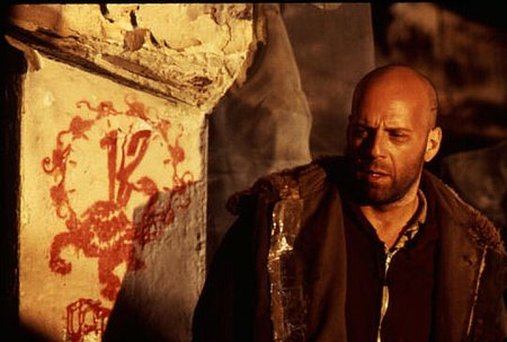- - -
12 Monkeys is one of the best movies about time travel ever made, so it is appropriate that we should start this column by highlighting it. Inspired by the framework of French science fiction film La Jetée, Terry Gilliam (Monty Python & the Holy Grail, Brazil) brings his signature brand of fantasy and dry humor that serve as a potent commentary on society's often arbitrary nature. It features Bruce Willis in one of his most nuanced roles: a survivor named James Cole, haunted and vulnerable to the point that the actor is completely absorbed by the character throughout. Madeleine Stowe plays psychiatrist Dr. Kathryn Railly who first (understandably) diagnoses him as a paranoid schizophrenic in the year 1990, but gradually sees the sincerity behind his actions when she can't rationalize things Cole shouldn't know after he returns in the year 1996. Her descent into his reality is the audience's descent -- and we are all finding either clarity or "divergence," as it is described so brilliantly in one scene. Cole is sent back in time from 2035 to find clues to incriminate revolutionary group The Army of the 12 Monkeys regarding an act of biological warfare that kills 5 billion people at the end of 1996 and drives the remainder of the human race underground.
Gilliam keeps the audience in suspense through his use of heightened reality -- things that are slightly "off" and could conceivably be explained away with Cole's delusion. Why are the scientists in 2035 so cartoonish, for example? They act almost as one being, finishing one another's sentences and speaking as if to soothe an animal's frayed nerves. Contrasted with the more understanding panel of psychiatrists in "present day," they seem more and more like a phantom designed to tell Cole what his psyche wants to hear. But then, this is deliberate. Gilliam makes excellent use of a world driven underground where everyone is caged, numbered, and prodded, suitable for use in experiments they neither want nor understand. There are deliberate allusions to Cole and the rest of the survivors being like caged monkeys, bound physically by force or to convention by choice. The audience likewise feels caged and as unsure as Cole.
Enter Brad Pitt as the charismatic Jeffrey Goines. Cole meets Goines when he is first committed to the mental institution in 1990 (a time he was never meant to inhabit in the first place). Goines is crazy with a capital C yet makes sense in the substance of his rants about humanity being enslaved to materialism. "We're all consumers!" he crows at one point (echoing the famous line later spoken by Tyler Durden in Fight Club); "If you play the game you're voluntarily taking a tranquilizer." In the scene, he's referring to literal board games, but Gilliam means it as motivation for Goines' actions -- the world is falling to pieces yet people are tranquilized by convention. "'Let's go shopping' is the cry of the true lunatic."
The film asks questions of inevitability. Can Cole go back and change the past to better the future, or will his going back be the thing that creates the chaos? Does Goines' effort to break convention actually bring about the things he warns of? In this sense, both characters suffer from the "Cassandra Complex:" the agony of foreknowledge combined with the impotence to do anything about it; in this case, however, Cole is less convinced he can succeed, whereas Goines is brazenly confident. And both men end up caught in a loop that never ends.
Perhaps the most telling scene of the film is where Cole comments on a viewing of Hitchcock's masterful Vertigo (where a local art house theater is running a "24-hour Hitchcock Fest"). He watches and notices it parallels his and Dr. Railly's situation, then muses aloud, "The movie never changes -- it can't change -- but every time you see it, it seems different because you're different." The viewer is left to wonder whether a man can change his fate, or whether he can only change himself within it; and if these two things are, in fact, one in the same.
- - -
Below: Watch La Jetée (The Jetty or The Pier in English), the 26 minute short film by Chris Marker that inspired 12 Monkeys.


 RSS Feed
RSS Feed
